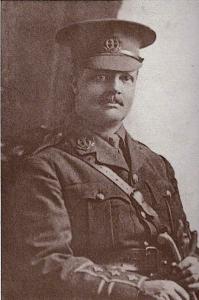
|

|
| Captain Charles Edward HILL | |
|
A Company, 13th (Service) Battalion Middlesex Regiment Date of birth: 16th June 1874 Date of death: 28th September 1915 Killed in action aged 41 Commemorated on the Loos Memorial Panel 99 and 100 |

|
| Charles Edward Hill was born at Ashurst in Sussex on the 16th of June 1874 the son of the Reverend Edward Hill, Rector of Ashurst, and Mary Arundell (nee Napier) Hill of the Rectory, Ashurst, later of Boxgrove Vicarage, Chichester in Sussex. He was educated at Lancing College where he was in Heads House from September 1889 to July 1894. He enlisted as a Private in the Manchester Regiment (Militia) on the 10th of December 1894 and rose to the rank of Sergeant before being commissioned as a 2nd Lieutenant in the 3rd Battalion Lancashire Fusiliers on the 3rd of August 1898. He was promoted to Captain in 1899 and retired from the army to the Reserve of Officers the same year. Following the outbreak of war he was recalled to the army and was commissioned in the 13th Battalion Middlesex Regiment. He embarked for France with his battalion from Folkestone on board the SS "Duchess of Argyll" at 9.45pm on the 1st of September 1915, landing at Boulogne at around midnight. The 25th of September 1915 saw the opening day of the Battle of Loos. The 13th Battalion Middlesex Regiment started the day at Beuvry where they had been in billets and received orders to move towards the fighting at 10am when they set out along the Vermelles Road. After spending part of the day waiting in some woods they received orders at 4pm to move up to the old British front line in front of the German position known as the "Quarries". In the event they didn't move forward until 11pm, spending the night in water filled trenches, with fighting lit by burning buildings, still going on to their front. At 3am on the morning of the 26th of September A Company, under the command of Charles Hill, moved forward on the left of the Middlesex line towards the "Slag Heap" of No 8 Fosse, to the southwest of the Hohenzollern Redoubt. Here they occupied former German support trenches. They were cut off from the battalion and were exposed to heavy artillery and rifle fire as well as facing several counterattacks by German infantry as the enemy attempted to wrest the position from the Middlesex men. Despite repeated attacks they held their position, and on the night of the 26th/27th a party managed to get through to them with a small quantity of food and water of which they had had neither since the morning of the 25th. They continued to hold their position until relieved on the morning of the 29th. His Commanding Officer wrote of Charles Hill's death:- "On Tuesday, 28th of September (it was the third day we had been in action), Captain Hill was holding a portion of the line near Fosse 8 de Bethune. A portion of his line had been driven in by some German bombers and rifle fire from a slag heap close by. I sent some bombers down to repel this attack, up the trench known as "Slag Alley", and went myself to direct the fire of a machine gun to support our attack. I was watching the machine gun fire and after about half an hour's fighting I saw our men with the bombing party rush at the Germans, closely followed by an officer with a pistol. Three Germans ran with their hands up, and turned round and stood in front of an officer with a pistol, who was, I firmly believe, Captain Hill. I could see him plainly through the glasses. The three surrendered Germans stood in front of him for a few seconds. I saw his pistol lowered, and in another second he fell, and the Germans ran away, fired on by our men at short range, and by machine gun, till they disappeared-either hit or into depressions or shell holes in the ground. Our men were apparently short of bombs, and so were the Germans, as our fire had stopped them coming up. I then went off to get some more bombers sent down from the regiment next to us, but by nightfall the portion of the trench where Captain Hill fell was in the hands of the enemy. I believe it was retaken next day after my regiment had been relieved, and again fell into the enemy's hands later. I spoke to a Corporal who went with the bombing party. He told me that Captain Hill had led them, and he feared that he was killed. It might be that he was only wounded, but my impression was, from the way he fell, that he was killed instantaneously at the moment of success. I cannot tell you how sad it is for us to lose him. He was one of the best, and died the death of a hero." He was married in Kent in 1907 to Margaret May (nee Donaldson) and they lived at 41 Royston Road, Penge in South London; they had a daughter, Constance Margaret. She applied for his medals in March 1922. |
|
| Heads House |
Back